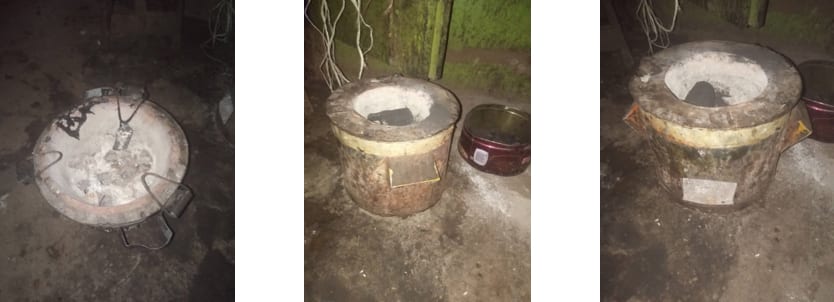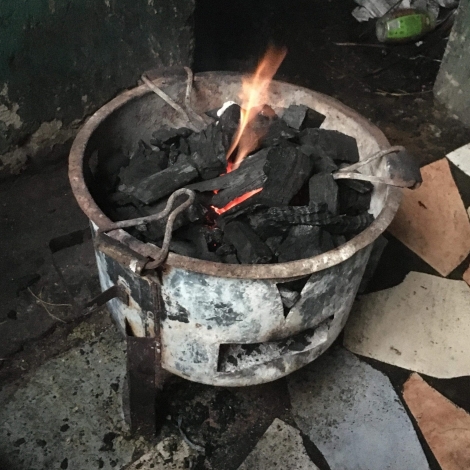A look inside the kitchen in Nigerian, Ghanaian and Ugandan homes suggests policy changes that could make cooking more affordable and environmentally friendly.
The most popular kinds of stoves in Nigeria are kerosene, gas, wood and charcoal, but these do not provide renewable energy or clean energy solutions. In Ghana, gas stoves tend to be used frequently. And in Uganda, the charcoal stove can be popular, but it’s disliked because of the large amount of time it takes to use. One Ugandan working mother named Farida shares that she “hates it because it takes long to burn and it is not easy to light.” There is one thing she likes about the stove, though: its low cost.

These are three perspectives showing the charcoal stove that Farida uses daily. Photos: Ken Kalungi
In communities where wood-burning stoves are used, they are still not good for the environment in the long run. For example, forests in northern Nigeria are becoming depleted because so many individuals are using firewood. Needless to say this cooking method is not sustainable and will only increase as an environmental issue in the future.
Since there are only a few kinds of stoves individuals use, what practical solutions are there for resource-thin communities, particularly in certain countries in Africa?
Subsidize Gas, Electric, or Petrol Stove Technology for Families
Dr. Rhoda Manzo, a local community leader and educator who lives in northern Nigeria, shares her insight on how to entice people to use less firewood while cooking. She shares that the, “government should make gas cheap so people use that.”
Digging deeper, there are concerns that the reductions that the Nigerian government already offer may not be sustainable, on the one hand, and may not be high enough for low-income consumers, on the other. According to the Africa Report:
“The Nigerian government subsidizes things like electricity and petrol – paying the difference between the cost to produce and the cost charged to customers – in order to make them more affordable. If the rise in the cost of petrol subsidies was not enough, subsidies to the power sector are rising fast too. Can the national budget take the strain – and how will things play out in upcoming elections? Africa’s second-biggest economy could spend as much as $5bn in subsidy payments by the end of the year, according to Lagos-based economic research and analysis firm Financial Derivatives Company (FDC).”
While gas is expensive, affording a gas cooking stove may be out of reach for many families. According the NigerianPrice.com, in 2019 a Gas Cooker is priced at N130,000–N150,000 (USD $365–$421), a Royal Gas Cooker costs N75,000–N90,000 (USD $210–$252), and the Chico Gas Cooker comes in at costing N50,000–N80,000 (USD $140–$225). Those prices amount to one or two month’s income for average Nigerian households. The average monthly household income in 2020 is roughly (USD) $200, according to the International Monetary Fund’s estimate of Nigeria’s per capita gross domestic product.
To better support families and entice them to use gas for their cooking, government policies should focus perhaps more on the technology itself. In other words, government policies should focus on subsidizing gas or other kinds of stoves, and not on gas or electricity itself.
Use Pay-As-You-Cook Stoves
Keeping costs down may be as simple as paying for what you use. A change in the stove manufacturers’ business model may make them accessible. For example, in Uganda the Fenix Fumba PayGo Cooking unit offers users the ability to pay just for what they take. It controls the usage with a timer, and the company allows three separate payment options to accommodate different budgets.
The concept has precedent. Pay-as-you-go models already sell many essential-needs products and services such as LPG, electricity, sanitation and others.
Dangers with Gas Stoves
Of course, gas stoves are not completely safe. Adults and, especially, children, can bump them and risk causing a fire or explosion. Additionally, gas stoves can leak and poison individuals in the kitchen. It is important to note these issues and keep in mind gas stoves may be a better environmental solution to wood fires, but they are not a perfect solution.
Conclusion
By offering subsidies for technology, rather than just fuel, and increasing pay-as-you-go cooking solutions, families in Nigerian, Ghana, and Uganda as well as other countries may be more likely to use renewable energy solutions and help the environment. Gas stove use could make an incredible difference in emissions and reduced deforestation if they offset the use of wood stoves and wood cooking fires. It is vital that families choose environmentally friendly ways to cook – and teach the next generation to do the same thing.


Please contact me. We have a unique RE powered solution that can be manufactured in at least one of the 3 countries. Thanks, best regards, Joseph